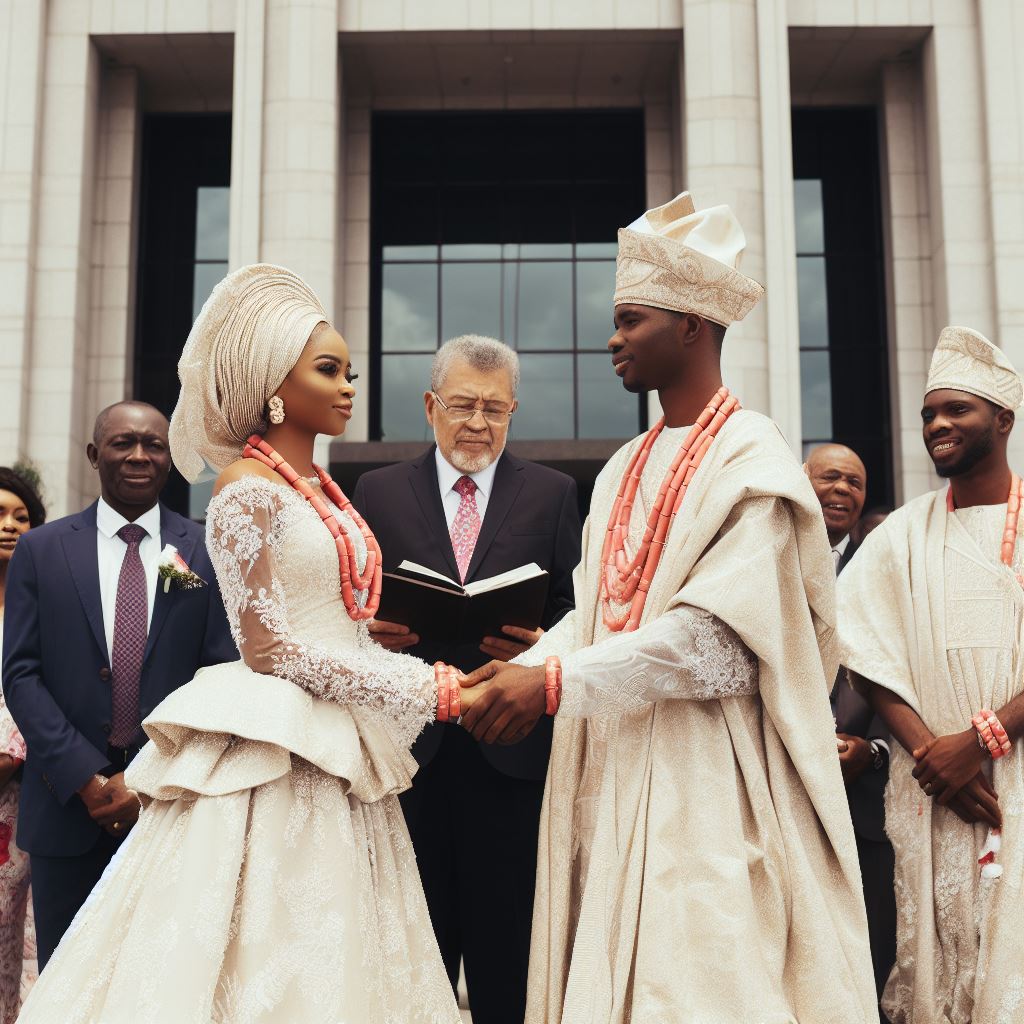Dealing with Family Pressures: Ordinance vs. Traditional Weddings
Last Updated on January 28, 2024
Introduction
Brief Overview
Weddings, a union of love, often grapple with family pressures, stemming from the clash of traditions and modernity.
These pressures can manifest in various ways, from guest list disputes to differing cultural expectations.
Importance
Recognizing and managing these pressures is vital for couples embarking on their marital journey.
Failing to address them can strain relationships with loved ones and add undue stress during what should be a joyous occasion.
Purpose
This blog aims to shed light on how couples can navigate the intricacies of ordinance and traditional weddings while maintaining family harmony.
We will explore the nuances of both types of weddings, consider the pros and cons, and provide practical strategies to strike a balance between honoring tradition and upholding your personal values.
Basically, our goal is to help couples make informed decisions that preserve family bonds while creating a meaningful, memorable wedding experience.
In the following sections, we’ll delve into the challenges that arise from family pressures, the advantages and disadvantages of both ordinance and traditional weddings, and offer guidance on finding the right path for your special day.
So, let’s embark on this journey to harmonious wedding planning!
Understanding Family Pressures
Definition of family pressures in the wedding context
- Family pressures refer to the influence and expectations exerted by family members during the wedding planning process.
- These pressures can come from immediate family, extended family, or cultural and societal norms.
- They often involve demands, opinions, and traditions that may clash with the couple’s preferences.
Common examples of family pressures in Nigerian weddings
- Insistence on having a large guest list, including distant relatives and acquaintances.
- Expectations of elaborate and lavish wedding ceremonies to showcase social status.
- Pressure to comply with traditional wedding customs and rituals, such as dowry payment.
- Preference for a specific wedding theme or venue chosen by the family.
- Imposition of religious or cultural traditions that may conflict with the couple’s beliefs.
Impact of family pressures on the couple
- Increased stress and tension within the couple’s relationship due to conflicting opinions.
- Feelings of frustration, as the couple’s desires may be overshadowed by family expectations.
- Financial strain from accommodating large guest lists and extravagant wedding demands.
- Lack of autonomy and control over the wedding planning process, leading to a sense of loss.
- Potential strain on relationships with family members if conflicts are not effectively managed.
Proactive steps to navigate these pressures
Dealing with family pressures in the wedding context can be challenging.
However, couples can take proactive steps to navigate these pressures and ensure their wedding reflects their own preferences and values.
It is crucial for couples to establish open and honest communication with their families from the start.
Expressing their desires and boundaries respectfully can help set clear expectations and avoid misunderstandings.
Couples should also prioritize their own needs and vision for the wedding.
By identifying what matters most to them, they can make decisions that align with their values and preferences.
Setting a budget and sticking to it can also provide a practical way to manage family pressures.
Having financial limitations can help couples justify their choices and prevent excessive spending under family pressure.
Seeking external support, such as professional wedding planners or counselors, can be beneficial.
These experts can provide guidance and mediation in situations where family pressures become overwhelming.
Ultimately, it is essential for the couple to remember that the wedding is about their love and commitment to each other.
While family and cultural expectations are significant, they should not overshadow the couple’s own wishes and happiness.
By finding a balance between honoring traditions and asserting their autonomy, couples can navigate family pressures and create a memorable wedding that reflects their unique journey.
Read: Top Venues for ‘Marriage by Ordinance’ Ceremonies in Nigeria
Ordinance Weddings
Explanation of ordinance weddings in Nigeria
Ordinance weddings have gained popularity in recent times in Nigeria due to their simplicity and cost-effectiveness.
Couples who opt for an ordinance wedding forego the grandeur and extensive rituals associated with traditional weddings.
Instead, they choose a straightforward and legally binding ceremony conducted in a court of law.
Benefits of opting for an ordinance wedding
Simplicity and cost-effectiveness
There are several benefits to choosing an ordinance wedding.
Firstly, it offers simplicity and is more cost-effective compared to traditional weddings.
Traditional weddings often involve elaborate ceremonies, elaborate decorations, and a large number of guests, which can be a significant financial burden.
In contrast, an ordinance wedding involves minimal wedding expenses, making it an attractive option for couples on a budget.
Less family involvement and pressure
Secondly, opting for an ordinance wedding reduces family involvement and pressure.
While traditional weddings often require extensive involvement from family members in the planning and execution of the event, ordinance weddings provide couples with more autonomy.
They can make decisions based on their preferences without having to navigate through various family opinions and expectations.
Legal recognition
Furthermore, ordinance weddings hold legal recognition.
These ceremonies are conducted in accordance with the law and are valid marriages.
This ensures that the couple’s rights and entitlements, such as inheritance and property rights, are protected.
Challenges of ordinance weddings
Disapproval and judgment from traditional-minded family members
However, there are challenges associated with choosing an ordinance wedding.
Traditional-minded family members may disapprove of this unconventional approach.
They may consider it disrespectful to cultural traditions and view it as a departure from the customary wedding practices.
The couple may face criticism, disapproval, and judgment from these family members, creating tension and strained relationships.
Balancing personal desires with family expectations
Another challenge is balancing personal desires with family expectations.
While ordinance weddings align with the couple’s desires for simplicity and autonomy, they may clash with their families’ expectations of a traditional celebration.
Negotiating and finding a compromise between these two perspectives can be emotionally challenging and require open communication and understanding.
In conclusion, ordinance weddings offer simplicity, cost-effectiveness, and legal recognition for couples in Nigeria.
However, they also come with challenges such as disapproval from traditional-minded family members and the need to balance personal desires with family expectations.
The choice between an ordinance wedding and a traditional wedding depends on the couple’s values, preferences, and ability to navigate familial pressures.
Read: Advantages and Disadvantages of Marriage by Ordinance in Nigeria

Traditional Weddings
Description of traditional weddings in Nigeria
Traditional weddings in Nigeria are deeply rooted in cultural traditions and hold great significance.
They are more than just ceremonies; they are a celebration of heritage and a way to strengthen family bonds.
The rich cultural diversity in Nigeria ensures that traditional weddings vary across different ethnic groups.
These weddings are marked by customs, rituals, and attire that reflect the specific traditions of each community.
For example, Yoruba traditional weddings feature the iconic gele headtie and agbada for men, while Igbo weddings are characterized by the vibrant isiagu fabric and the formal presentation of wine.
Advantages of traditional weddings
Cultural preservation and representation
One of the major advantages of traditional weddings is the preservation and representation of culture.
By adhering to traditional customs, couples keep their heritage alive and pass it on to future generations.
This helps to maintain a sense of identity and pride within the community.
Strengthening family bonds and connections
Additionally, traditional weddings provide an opportunity for families to come together and strengthen their bonds.
The festivities create a joyful atmosphere where relatives from far and wide can reconnect, fostering unity and harmony.
These weddings also serve as a platform for socializing, allowing attendees to interact, celebrate, and forge new relationships.
Drawbacks of traditional weddings
Financial burden on the couple and their families
Despite their cultural significance, traditional weddings do come with some drawbacks.
One major drawback is the financial burden they impose on the couple and their families.
The costs associated with elaborate decorations, expensive attires, and large-scale catering can be overwhelming.
The financial strain can put pressure on the couple and their families, potentially causing tension and anxiety during the planning process.
High expectations and pressure from extended family members
Furthermore, traditional weddings often involve high expectations and pressure from extended family members.
Relatives may have specific customs and traditions they expect the couple to follow, leaving little room for personal preferences.
This can add additional stress to the already demanding task of organizing a wedding.
In conclusion, traditional weddings in Nigeria have both advantages and disadvantages.
They offer an opportunity for cultural preservation, family bonding, and joyful celebrations.
However, they also pose financial challenges and can subject couples to the expectations and pressures of extended family members.
Nevertheless, traditional weddings remain an integral part of Nigerian culture, showcasing the country’s rich heritage and traditions.
Read: Marriage by Ordinance vs. Traditional Marriage: What’s Different?
See Related Content: Christian, Islamic, & Customary: Marriage Definitions Explored
Navigating the Decision-making Process
Dealing with family pressures can be a challenging task, especially when it comes to choosing between a traditional or ordinance wedding.
Navigating the decision-making process requires open communication, assessing personal priorities and values, understanding cultural backgrounds, negotiating compromises, and seeking external support if needed.
Importance of open communication with your partner
When dealing with family pressures regarding wedding choices, it is crucial to have open communication with your partner.
Discuss your desires, concerns, and the potential influence of family expectations.
Honesty and understanding build a solid foundation for navigating the decision-making process.
Assessing personal priorities and values
Understanding your personal priorities and values is essential in making decisions that align with your beliefs.
Reflect on what matters most to you and how your wedding can reflect those priorities.
This self-assessment will help you make choices that are true to yourself.
Understanding and respecting each other’s cultural backgrounds
In multicultural families, wedding decisions can be influenced by cultural backgrounds.
It is vital to understand and respect each other’s cultural traditions and practices.
This understanding allows for meaningful compromises that honor both individual and collective identities.
Negotiating compromises with family members
Family pressures often emerge from differing expectations.
Negotiating compromises with family members can be a solution.
Openly discuss the reasons behind your choices to help them understand your perspective.
Seek a middle ground that respects their wishes while staying true to your own preferences.
Seeking external support and guidance if needed
If the pressure becomes overwhelming, seeking external support and guidance can be beneficial.
Family therapists or wedding planners experienced in dealing with family dynamics can provide valuable advice.
They can help mediate conflicts, provide perspective, and assist in finding solutions that satisfy all parties involved.
Remember, the key to successfully navigating the decision-making process is maintaining open communication with your partner throughout the wedding planning journey.
Understand your own priorities, embrace cultural differences, negotiate with family members, and seek support when necessary.
By doing so, you can navigate family pressures with confidence and create a wedding that represents both your love and your individuality.
Read: Understanding ‘Marriage by Ordinance’ in Nigeria: A Primer
Conclusion
We have discussed the key points involved in dealing with family pressures regarding ordinance and traditional weddings.
It is important to encourage individuals to stay true to themselves while also respecting their family traditions.
Finding a balance between an ordinance wedding and a traditional wedding is essential for a successful and harmonious celebration.
All in all, it is crucial to remember that weddings are a personal choice and the final decision should be made by the couple.
By communicating openly with their families and expressing their desires respectfully, individuals can navigate through family pressures and create a wedding that is meaningful and authentic to them.
While it may be challenging to find a compromise that satisfies both sides, it is possible to create a wedding that incorporates elements of both ordinance and traditional ceremonies.
Ultimately, the most important aspect is for the couple to feel happy and fulfilled on their special day, surrounded by the love and support of their families.
By embracing their individuality and respecting the values and beliefs of their families, couples can find a balance that allows them to start their journey together with joy and harmony.


